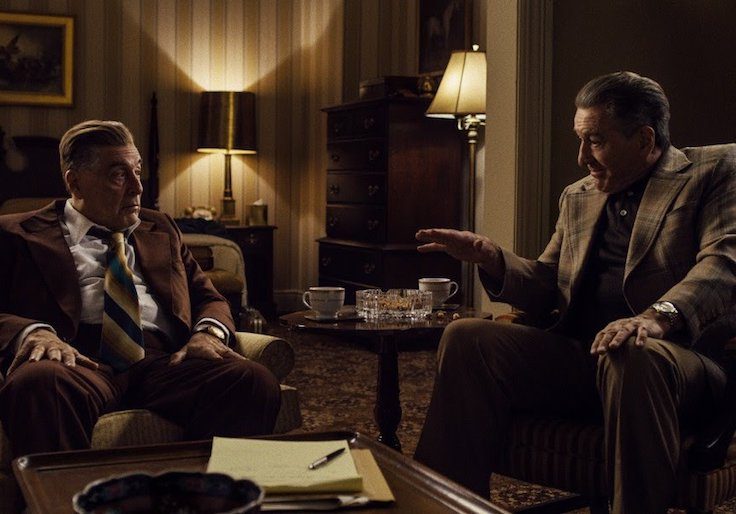I like a good, long, juicy movie, so when I heard Martin Scorsese's The Irishman ran three-and-a-half hours, I sure knew it was long. What I didn’t know is whether it was good or juicy. The answer is that it's good—very, very good—but it's not really juicy. You can't just sink into it the way a great epic allows you to sink in and get yourself taken on a transporting journey. Director Martin Scorsese and screenwriter Steven Zaillian cast a cold, analytical eye on the story they tell about the Philadelphia mob, the Teamsters, and the disappearance of Jimmy Hoffa even as they re-create the America of the 1950s, 1960s, 1970s, and 1990s in the most loving and luscious ways. If you could eat art direction, The Irishman would be like dining at Peter Luger's in the old days. Still, the movie's rigorous lack of sentimentality about the wretched characters it offers up for our scrutiny keeps you at a slight distance.
We see the action through the eyes of Frank Sheeran, played by Robert De Niro in a wonderful performance I really doubted he still had in him. Sheeran was both a functionary in the Philadelphia mob and a working-man trucker who ended up in Jimmy Hoffa's inner sanctum in the 1950s just as Hoffa was solidifying his hold on the most powerful and important nongovernmental organization in America. The movie comes to center on Sheeran's claim at the very end of his life that he killed Hoffa, by now so thoroughly debunked (the latest and most definitive debunking is by Jack Goldsmith in the New York Review of Books) that it's kind of amazing how the movie treats it as the gospel truth.
Al Pacino is Hoffa, and he's glorious here. It's become a standard cliché that Pacino took a turn into hamminess back in the early 1990s and never looked back, and it's a cliché I revile—because the enthusiasm and relish this extraordinary actor brings to a part that actually justifies his attention is akin to breathing in the purest oxygen. His vitality is revitalizing, and perfect for the part. And in The Irishman his infectious portrait of the galvanizing Hoffa offers a perfect contrast to De Niro's embodiment of pure existential toadyism.
Sheeran becomes a beloved sidekick not only to Hoffa but to Russell Bufalino, the head of the Philadelphia mob, because he always says exactly what they want him to say, does what they want him to do, and seems to have little personality of his own. He transitions from petty thug to hit man with nary a thought; he has to kill a guy to save his own skin, and he acts without hesitation or emotion. He finds himself in an impossible situation as the film reaches its climax when he must play messenger between his mob boss and his union boss, because his impulse is to tell them both what they want to hear.
It's a brilliant piece of characterization. I can't think of a better portrayal onscreen of the life of a middleman. When Jimmy Sheeran finds himself pulled in every direction—once in a situation comparable to that of Michael Corleone with the gun in his hand deciding whether to make the move that will commit him forever to a life on the other side of the law—he reacts by not reacting. He just doesn't have enough self to betray himself.
Yes, Pacino is fantastic and De Niro is fantastic (especially in a single scene, a phone call with Hoffa's wife, that is probably De Niro's greatest piece of acting). But the performance of the movie is given by Joe Pesci as Russell. Largely absent from the screen for the past 20 years, Pesci suppresses the spark-plug energy of his indelible "Funny like I'm a clown?" embodiment of psychopathy in Goodfellas and gives us instead a man so comfortable in his own skin that his very repose succeeds in transmitting an equally terrifying menace. I had thought that Brad Pitt was unbeatable for best supporting actor for his amazing work in Once Upon a Time…in Hollywood, but clearly Pesci is going to give Pitt a run for his money.
The Irishman cost an incredible $160 million to make, largely (one gathers) from the expense of using special-effects technology perfected by the very Marvel movies Scorsese has lately denounced to "de-age" De Niro, Pacino, and Pesci. The effect is meticulous up to a point; it does make them look considerably younger, but more like they're in their 50s when in at least one scene De Niro is supposed to be 23 or 24. At one point, when a child is being baptized, I thought the baby was Jimmy’s granddaughter, not his daughter.
But listen. In The Man Who Shot Liberty Valance, we're supposed to believe that the 54-year-old James Stewart is in his late 20s, and that was before de-aging. Suspending disbelief isn't that hard, it turns out. But I will say that in the scenes when Pesci requires no de-aging, because he's playing his character at his present age, his gnarls and wrinkles only contribute to the sense he conveys that Bufalino has seen it all, done it all, and is living a damned life entirely without illusion.
In the end, The Irishman is an intimate three-character study on an epic scale. It will debut on Netflix in three weeks, and the truth is that its combination of intimacy and scope may work better on the small screen. For one thing, you can pause it to go to the bathroom. In the movie theater, there's no intermission. It's 209 minutes long. Given what we know of the aging male's anatomy, there's little chance Scorsese, Zaillian, De Niro, Pacino, or Pesci could make it through their own movie without a bathroom break. Sorry to bring it down to this level, but I'm just trying to keep it real.
